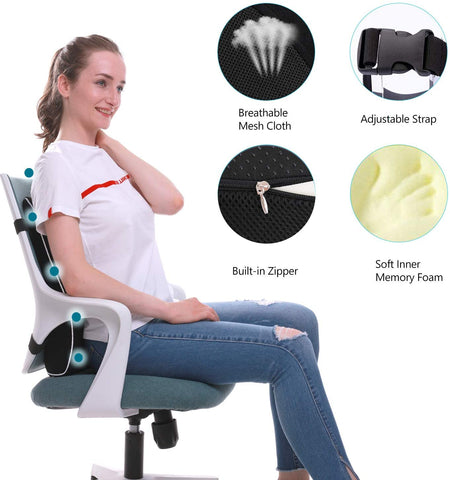
Why more and more office workers choose lumbar support
When it comes to sitting for extended periods of time, maintaining good posture is important, so it's no surprise that many of us turn to lumbar support to help alleviate back pain and prevent further damage to our spines. But does lumbar support really work, or is it just a placebo effect? Let's take a closer look to try and find out.

First, let's discuss what lumbar support actually is. Lumbar support refers to a device, often made of foam or memory foam, that is designed to fit into the natural curve of the lower back. This can come in the form of a cushion or a chair with built-in lumbar support.
Many people who use lumbar support devices claim that they help to relieve back pain, improve posture, and reduce overall discomfort. But does science support these anecdotal claims?
The answer, it seems, is yes- to a certain extent. Research has shown that the use of lumbar support can indeed help to reduce lower back pain, at least in the short term. In a study published in 2014 in the Journal of Physical Therapy Science, researchers found that using a low-back support cushion while sitting for two hours significantly reduced low back pain in healthy individuals.
Another study, published in the Journal of Occupational Rehabilitation in 2003, found that patients with chronic low back pain reported significant reductions in pain, disability, and perceived social support after using a lumbar support device for just four weeks.
So, it seems that lumbar support can be an effective tool in managing lower back pain in many cases. However, it's not a magic cure-all. It's important to remember that lumbar support is just one tool in a comprehensive approach to preventing and treating lower back pain.
It's also important to choose the right type of lumbar support for your needs. If you spend a lot of time sitting in an office chair, for example, you may benefit from a chair with built-in lumbar support. If you're on a budget, a lower back cushion can work just as well.
It's also important to note that lumbar support may not be appropriate for everyone. If you have an underlying condition that is causing your back pain, such as a herniated disc or sciatica, lumbar support may not be effective for you. In these cases, it's important to consult with a healthcare professional for proper treatment and management.
In conclusion, lumbar support can be an effective tool in managing lower back pain, but it's not a cure-all. When used in conjunction with other treatments and lifestyle changes, however, it can help to alleviate discomfort and improve overall quality of life.




